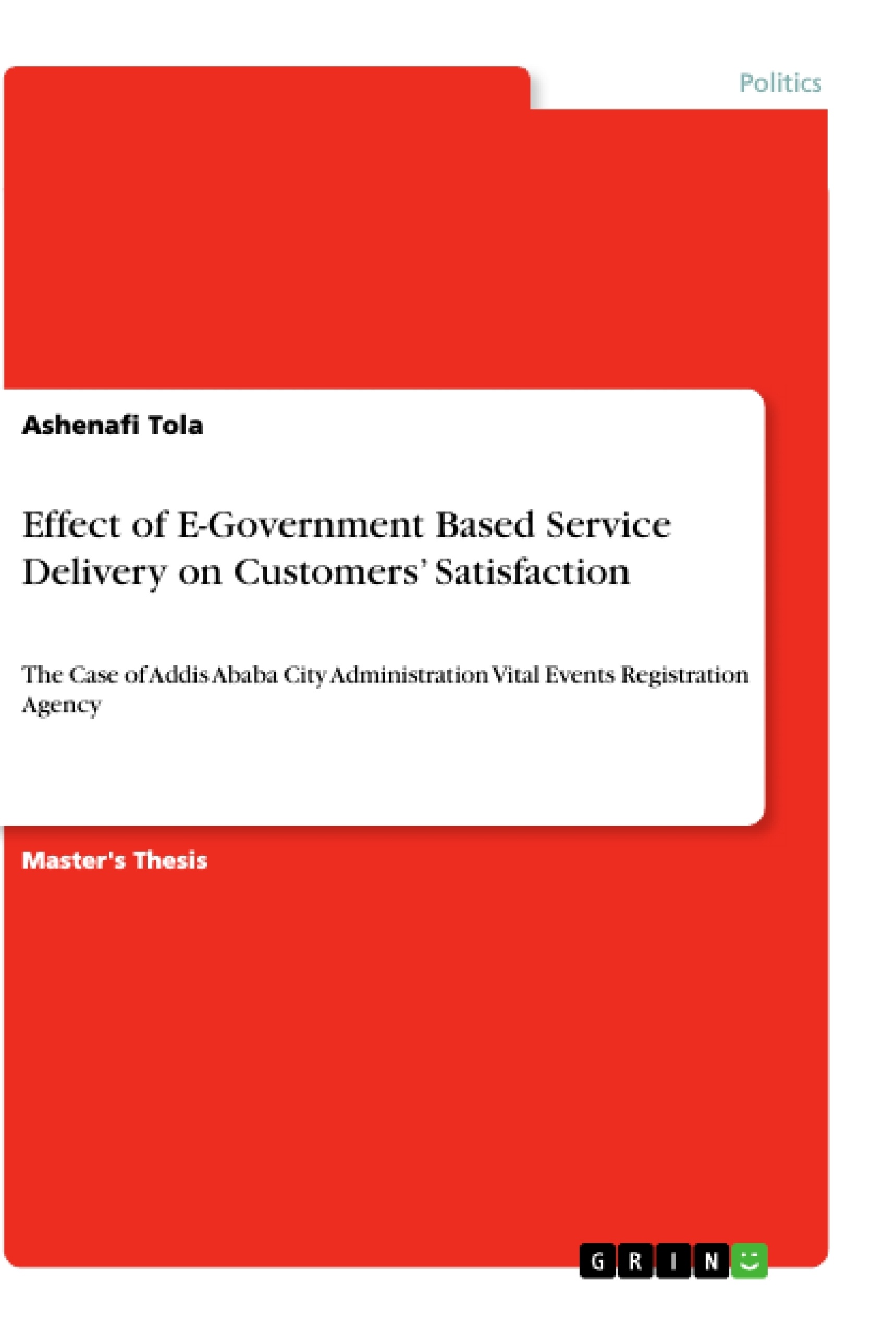The general objective of this study is mainly to examine the effect of e-government based service delivery on customers’ satisfaction in the case of Addis Ababa city Administration vital events registration agency. It answers the following questions: What is the level of quality of e-government based services delivery in AAVERA? Do E-Government factors affect customers’ perception of service quality in Addis Ababa Vital Events Registration Agency? Is the perceived service delivery a significant predictor of customers’/citizens’ satisfaction? What challenges and additional measures can be taken to improve the E-Government service delivery in Addis Ababa vital events registration agency?
The emergence of electronic government both in practice and in concept has been one of the important developments in public administration in the past ten years. It seems to be the next generation of the development in the public sectors. To greater extent governments around the world are introducing e-government as a means of reducing costs, improving services for citizens and increasing effectiveness and efficiency at national, regional and local levels of the public sector. This research mainly examined the effect of e-government based service delivery on customers’ satisfaction in Addis Ababa Vital Events Registration Agency by using TAM and SERVQUAL Models. Convergent parallel mixed research design was adopted to guide the study with both quantitative and qualitative data. Quantitative data was analyzed by using Standardized multiple regressions Model (ANOVA and correlation coefficient) and Binary Logistic regression model was used to test the hypotheses. Qualitative data were analyzed using five steps (Compiling, disassembling, reassembling, interpreting and concluding) of data. All data were gained from questionnaire, key informants interview, focus group discussion and secondary data to achieve its objective.
Inhaltsverzeichnis (Table of Contents)
- Introduction
- Background of the Study
- Statement of the Problem
- Objectives of the Study
- General Objective
- Specific Objectives
- Research Questions
- Significance of the Study
- Scope of the Study
- Organization of the Study
- Literature Review
- Conceptual Framework
- E-Government
- Service Delivery
- Customers' Satisfaction
- Theoretical Framework
- Technology Acceptance Model (TAM)
- DeLone & McLean Information Systems Success Model
- Service Quality Model (SERVQUAL)
- Empirical Review
- Research Methodology
- Research Design
- Population and Sampling
- Data Collection Method
- Questionnaire
- Interview
- Data Analysis Method
- Results and Discussion
- Socio-demographic Characteristics of the Respondents
- Analysis of Service Quality Gaps
- Regression Analysis Result
- Logistic Regression Model
- Summary, Conclusion and Recommendations
- Summary of Findings
- Conclusion
- Recommendations
- References
- Appendices
Zielsetzung und Themenschwerpunkte (Objectives and Key Themes)
This research explores the impact of e-government service delivery on customer satisfaction within the context of the Addis Ababa City Administration Vital Events Registration Agency (AAVERA). The primary objective is to examine the relationship between e-government implementation and customer satisfaction levels. This includes an investigation of the factors that influence satisfaction, the perceived quality of services provided, and the efficacy of e-government initiatives in enhancing the user experience.
- The role of e-government in modern service delivery
- The impact of e-government services on customer satisfaction
- Factors influencing customer satisfaction within the context of e-government
- Analysis of service quality gaps and their influence on customer perception
- The effectiveness of e-government implementation in improving service delivery and customer satisfaction
Zusammenfassung der Kapitel (Chapter Summaries)
- Introduction: This chapter sets the stage for the research, providing background information about e-government, service delivery, and customer satisfaction. It outlines the research problem, objectives, significance, and scope of the study.
- Literature Review: This chapter delves into the theoretical and empirical literature on e-government, service delivery, and customer satisfaction. It presents key concepts, theories, and models relevant to the study.
- Research Methodology: This chapter details the research design, population, sampling methods, data collection techniques, and data analysis approaches employed in the study.
- Results and Discussion: This chapter presents and analyzes the findings of the study. It explores the socio-demographic characteristics of the respondents, examines service quality gaps, and presents the results of regression analysis and logistic regression modeling.
Schlüsselwörter (Keywords)
This research focuses on the key concepts of e-government, service delivery, customer satisfaction, technology acceptance, information systems success, service quality, and empirical research methodologies. It examines the impact of e-government implementation on customer satisfaction levels and explores the factors that influence these perceptions, including service quality gaps and the efficacy of e-government initiatives in improving service delivery.
- Quote paper
- Ashenafi Tola (Author), 2020, Effect of E-Government Based Service Delivery on Customers’ Satisfaction, Munich, GRIN Verlag, https://www.grin.com/document/915677



